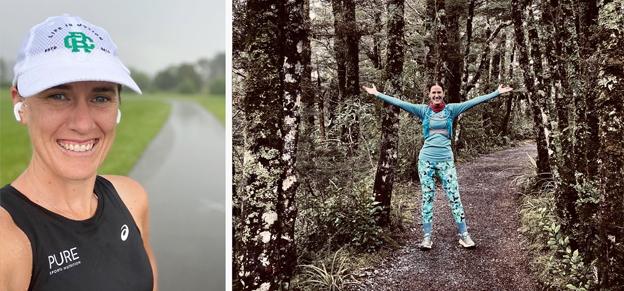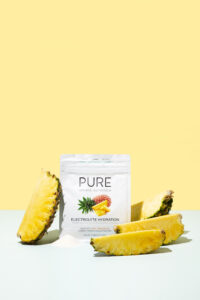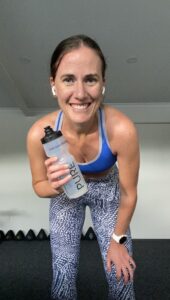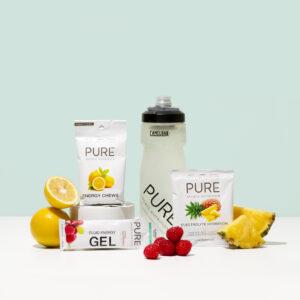 Our bodies generally have enough reserves for up to 60-90 minutes of exercise so for longer endurance events there is a large deficit of energy and hydration. As the duration of the event increases, so does our bodies requirements which can result in many nutrition challenges along the way. How do we fill the deficit? Sports nutrition, but which one? It can be a very personal decision, is it too sickly sweet, do you like the flavour, does it sit well in the stomach, does it even have what you need in it?
Our bodies generally have enough reserves for up to 60-90 minutes of exercise so for longer endurance events there is a large deficit of energy and hydration. As the duration of the event increases, so does our bodies requirements which can result in many nutrition challenges along the way. How do we fill the deficit? Sports nutrition, but which one? It can be a very personal decision, is it too sickly sweet, do you like the flavour, does it sit well in the stomach, does it even have what you need in it?
We talk to registered Sports & Exercise Nutritionist (BAppSc, University of Otago) and co-founder of PURE Sports Nutrition, Marewa Sutherland and Kate Southern trail runner and PURE ambassador. Kate takes us through her nutrition diary and how she uses the PURE range to her advantage.
A runner’s nutrition plan should start well before race day and Sports Nutritionist, Marewa, always recommends to her athletes to trial, trial, trial “you need to know what works for you.” For trail runner, Kate, her race day nutrition plan starts around 3-4 days prior, but every athlete is different so this will differ for some, especially those who are beet loading (beetroot is high in a naturally occurring compound called nitrate. Once in the body, nitrate is converted to nitric oxide which in simple terms helps to open up our blood vessels), you’ll need to think about it 5 days out.
Preloading + Before the Race
When we talk about preloading, we are adding extra into the body in preparation for the big day. So, you’ll be looking to increase carbs, protein and loading up on electrolytes, I’m also making sure I’m really hydrated so I’m using the PURE Electrolyte Hydration Low Carb 3-4 days leading into an event. I find that works really well for me and it also means the morning of the event I’m not trying to drink heaps.” Kate explains. Marewa adds “this is going to ensure an athlete is fully hydrated to race and you could also choose a sports drink that has carbs to provide fast absorbing carbohydrates for carb loading muscles and it also helps maintain electrolyte levels. It’s also a good idea to begin drinking as soon as you wake up, on race day, to allow plenty of time for your body to hydrate. Eat 2-4 hours prior to allow for digestion and to top up blood sugar levels, a gel 15 min before go time is perfect!”
During
“For ultras I will fuel to a schedule alternating between gels, on the hour, and solid fuel (I really like the OSM bites), on the half hour, to keep energy levels topped up and avoid any slumps. It works for me. It feels like a lot at the time, but it just means you never dip in your energy levels. If you don’t keep topping up and you get into a hole, its quite hard to get out I’ve found. I like to mix gel flavours; lemon lime and apple cinnamon are my favs and I use the caffeine ones later in the event so I’ll have the cola ones cause they’re just yummy. If I can’t be bothered eating towards the end, I’ll have another gel instead of solids. I drink 300-400 ml of hydration, for ultra’s mostly I use the PURE Endurance Formula”. The Endurance Formula has added protein to help prevent muscle breakdown in exercise and aid faster recovery.
Marewa stresses “Your carb aims for endurance exercise are around 30-60 g per hour, but it can be upwards of 90g, everyone is different, and you should mix your carbohydrate sources. Kate is also a bit of a unicorn in respect that she doesn’t suffer from cramp, but many runners will need more electrolytes than their hydration has so taking extra, like PURE Electrolyte Replacements Capsules, is a good idea”.
Kate notes that she doesn’t use aid stations but instead carries servings of hydration to mix with water at the aid stations. “I know what works for me so I’m not going to add in anything that I haven’t trialled!” Marewa again adds that it is super important to trial your nutrition in training, so if you are going to use the aid stations get onto the event website and find out what’s on offer and incorporate it into your training to make sure it sits well with you.
PURE Exercise Recovery is Kate’s favourite from the range, and she uses it as part of her recovery routine, it’s a complete recovery solution with natural sources of protein, carbohydrates and electrolytes. The powder can be mixed with water so its very convenient for on the go. “The Exercise Recovery gets me on the recovery track and it’s super easy so why wouldn’t you? I love the flavour and how well it works. I place a lot of importance on recovery, I always include a serving in my bag for at the finish line of events.” Kate will also continue with her hydration if needed.
Marewa’s recovery tips “It’s important to get 20 grams of protein within 30-60 minutes of your run to help build and repair muscles and hydration is an often-overlooked part of recovery. Adequate fluid and electrolyte replacement ensures nutrients can be delivered around the body, via blood, to promote recovery.”
Why PURE?
Kate has the last word on why she chooses PURE: “Before I switched to PURE, the brand I used previously was okay, but I noticed I would fatigue very quickly of the flavour and sweetness and I therefore wouldn’t drink as much and usually ended up dehydrated. Plus, nausea, towards the end of a long run and an unsettled stomach for hours after the end of a run, was not uncommon. A friend suggested PURE and I haven’t looked back, and even just on that first run with it I just enjoyed that it wasn’t too sweet, it was a nice flavour. With the gels the texture is really nice, it’s more like a thick juice than a gluggy gel and it’s easier to get down. I feel like PURE works for me, and I like that it’s natural tasting and I really like that it’s made in New Zealand.”
Visit www.puresportsnutrition.com to view the full range!










